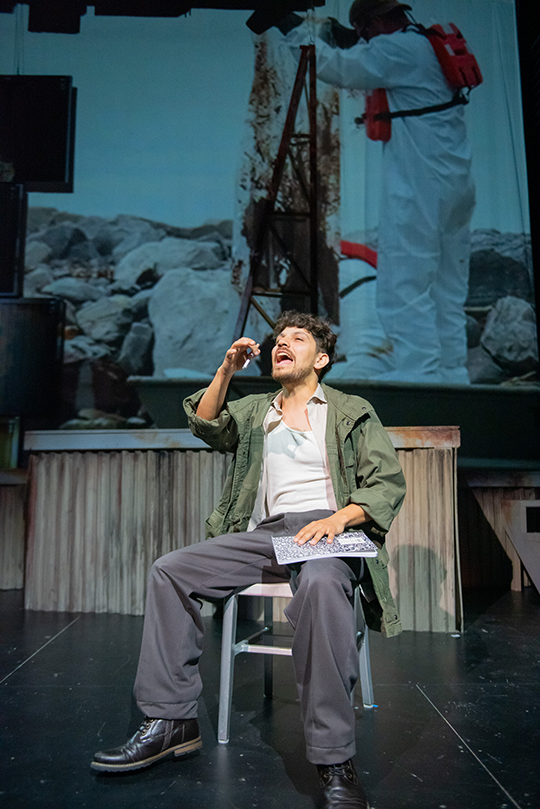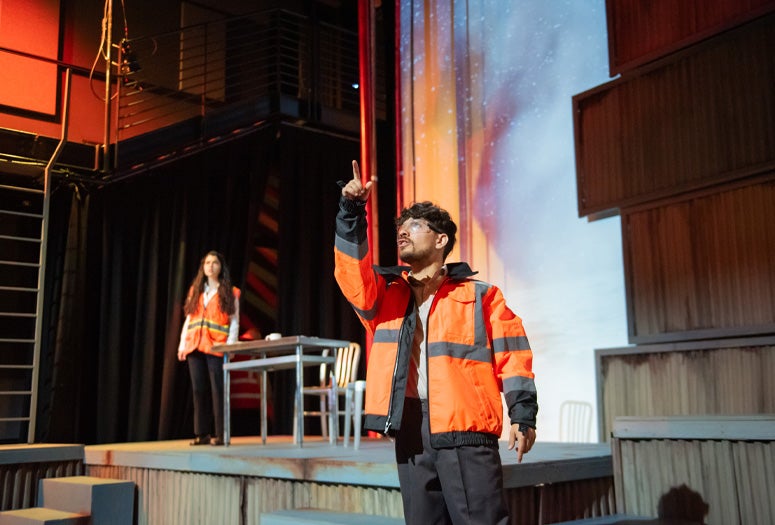
Fifteen years after the Deepwater Horizon explosion unleashed the largest marine oil spill in U.S. history, Rice University hosted a timely and intimate conversation about the personal and political fallout that continues to ripple across the Gulf Coast.
At the heart of the discussion was “SPILL,” the documentary play written by Leigh Fondakowski, known for her work on “The Laramie Project” and other investigative theater pieces. “SPILL” draws from hundreds of hours of interviews with people affected by the disaster on April 20, 2010, that killed 11 workers and released millions of barrels of oil into the Gulf of Mexico.
The event before the play’s matinee performance in the Moody Center for the Arts’ Lois Chiles Theater brought Fondakowski together with Weston Twardowski, associate director of Rice’s Center for Environmental Studies, and Gökçe Günel, associate professor of anthropology, for a candid Q&A about the making of the play and the enduring complexities of environmental storytelling.
“I always approach the interview process mainly as a dramatist and as a storyteller,” Fondakowski said.
What emerged from Fondakowski’s years of interviews was not a straightforward narrative of villainy or redemption. Instead, “SPILL” exposes the contradictions that define the Gulf Coast, where oil and nature are so deeply entangled it becomes difficult to imagine one without the other.

“One of the things that really struck me in the beginning of talking to people in Louisiana was what I came to think of as a myth — that oil and nature could exist side by side harmoniously,” Fondakowski said. “After the spill, that idea maybe was fractured a tiny bit by the unstoppable spill, but there was a return to it at the end.”
Twardowski recalled attending the original production in Louisiana more than a decade ago. One moment that stayed with him involved a man from the audience confronting Fondakowski after the show.
“He said, ‘I came here to prove you wrong,’” Fondakowski said. “‘But you captured our community’s story.’”
That encounter underscored the rarity and power of “SPILL’s” approach. For many in Fondakowski’s audiences, the plays are their first experience with live theater. For Fondakowski, bringing those voices to the stage, especially in the places most affected, was the only way to do the story justice.
“To me, that’s the kind of heights that theater can achieve, that kind of public discourse around this kind of tragic event,” Fondakowski said.
The Gulf Coast’s relationship with the fossil fuel industry remains emotionally charged and politically fraught. Günel, whose research focuses on energy infrastructure and climate change, noted that even now, the legacy of Deepwater Horizon is not easily framed as a pivot point.
“There was a pushback and certain regulations were instituted after the spill that made safeguards for offshore drilling,” Günel said. “Many of those regulations now are under question. It’s hard to see (the spill) as an inflection point because we’re lessening the inflection point that it was.”
Günel also emphasized that fossil fuel infrastructure continues to expand, often with community support.
“There’s still enthusiasm about fossil fuels,” Günel said. “And there will be more investments in the next four years to set up around fossil fuels.”

Fondakowski too said she woke up after seeing “SPILL” again in Houston with lingering anxiety about the present.
“I was haunted by the present moment in terms of NOAA and wildlife and fisheries and how there’s some controversy about the Coast Guard’s role, but they did intervene,” Fondakowski said. “They did save a lot of fish and animals, and eventually they stopped the spill. I woke up a little bit haunted by science being under threat.”
That complexity shapes every facet of “SPILL,” which Fondakowski described not just as documentary theater but as a carefully crafted piece of art. The script relies heavily on the exact words of her interviewees — from poetic metaphors to speech patterns that reflect the lived experience of oil workers, environmentalists and bereaved families alike.
“People are incredibly poetic,” Fondakowski said, responding to an audience question about how she weaved together the interviews and testimony.
One character, Shane Rush, compares the Earth to a red balloon being poked with a needle. Another, Jorey Danos, struggles to articulate his grief and ends with: “I can’t say it the way you want me to say it.” Fondakowski said that moment was key.
“He said it exactly how I needed him to say it,” she said. “I knew in that moment that I would use that exchange in the play, so the audience could feel they were one degree of separation from meeting Jorey.”
The conversation also touched on empathy, a central concern of both ethnography and art.
“Somebody who thinks completely differently from me becomes fascinating,” Fondakowski said. “As an artist, I want to get inside their thinking and to really understand them and represent them authentically.”
Also on display at the Moody as part of the spring exhibition “Breath(e): Toward Climate and Social Justice,” “Ghosts of the Gulf” highlights the upcoming anniversary of the disaster. The series by Louisiana-based artist, biologist and environmental educator Brandon Ballengée features fish portraits painted with crude oil sourced from the Gulf. It’s on display until May 10.
From oral history to artistic intervention, the work being done at Rice aims to ask not only how we remember the disaster but what, if anything, have we learned.
“There’s an argument that this play is one of these opportunities where we could imagine this alternative reality, this alternative solution,” Twardowski said. “And that hasn’t happened. Yet.”


